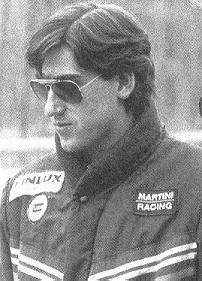Henri Toivonen

Henri Toivonen during his Martini Racing era
|
|
| Personal information | |
|---|---|
| Nationality | Finnish |
| Born |
25 August 1956 Jyväskylä, Finland |
| Died | 2 May 1986 (aged 29) Corsica, France |
| World Rally Championship record | |
| Active years | 1975–1986 |
| Co-driver |
|
| Teams | Talbot, Opel, Porsche, Lancia |
| Rallies | 40 |
| Championships | 0 |
| Rally wins | 3 |
| Podiums | 9 |
| Stage wins | 185 |
| Total points | 194 |
| First rally | 1975 1000 Lakes Rally |
| First win | 1980 Lombard RAC Rally |
| Last win | 1986 Monte Carlo Rally |
| Last rally | 1986 Tour de Corse |
Henri Pauli Toivonen (25 August 1956 – 2 May 1986) was a Finnish rally driver born in Jyväskylä, the home of Rally Finland. His father, Pauli, was the 1968 European Rally Champion for Porsche and his brother, Harri, became a professional circuit racer.
Toivonen's first World Rally Championship victory came with a Talbot Sunbeam Lotus at the 1980 Lombard RAC Rally in Great Britain, just after his 24th birthday. He had the record of being the youngest driver ever to win a world rally until his countryman Jari-Matti Latvala won the 2008 Swedish Rally at the age of 22. After driving for Opel and Porsche, Toivonen was signed by Lancia. Despite nearly ending up paralysed at the Rally Costa Smeralda early in 1985, he returned to rallying later that year. He won the last event of the season, the RAC Rally, as well as the 1986 season opener, the Monte Carlo Rally, which his father had won exactly 20 years earlier.
Toivonen, driving a Lancia Delta S4, died in a crash on 2 May 1986 while leading the Tour de Corse rally in Corsica. His American co-driver, Sergio Cresto, also died when the Lancia plunged down a ravine and exploded. The fatal crash had no close witnesses and the only remains of the car were the blackened spaceframe, making it impossible to determine the cause of the crash. Within hours of the crash, Jean-Marie Balestre, then President of the FISA, had banned the powerful Group B rally cars from competing the following season, ending rallying's popular supercar era.
...
Wikipedia
